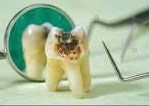Do all my cavities need to be filled?

Do all my cavities need to be filled ?
Many people are apprehensive about trips to the dentist because of the fact that filling cavities can be scary and uncomfortable. In the past, dentists have filled every cavity. However, new research and technology allows Ingber Dental to offer alternatives to dental fillings. These alternatives may vary depending on the size and depth of the cavity, as well as your own risk for getting cavities and how well you take care of your teeth.
What kind of cavity doesn’t need to be filled?
If you have a very small cavity limited to the enamel (or outer layer) of your tooth, you may not need to get a filling. This is especially true if you have had very few cavities in the past and practice good oral hygiene. In addition a supplemental fluoride rinse such as ACT may be recommended by either one of our dentists or dental hygienists. Whether your cavity fits into this description will be determined by your dentist.
&srotate=0)
What happens to these small cavities over time?
Very small cavities limited to the enamel, which we call “decalcification,” can be reversed with good oral hygiene (brushing and flossing) and use of fluoride mouthrinse and toothpaste. Your dentist may also recommend a fluoride varnish, which is a sticky fluoride substance applied to your teeth in the office. While the cavity is small, it is reversible, meaning the fluoride in toothpaste and mouthrinse can remineralize the enamel on your tooth. Ingber Dental will determine if your cavity is small enough to “watch” and “remineralize” over time.
&srotate=0)
What kind of cavities do need fillings?
Not every cavity can be monitored over time, and some require treatment, such as a filling, crown, root canal, or extraction. Ingber Dental will make the determination of this with you. Generally, if the cavity has progressed past the enamel, or gives you pain or sensitivity, your dentist will need to remove the cavity in order to prevent the decay from spending.
What should I do if my dentist says I have a small cavity or decalcification?
If Ingber Dental identifies that you have a cavity that can be remineralized, you should take extra care to keep that tooth (as well as all of your teeth) clean. You should brush your teeth with fluoridated toothpaste in the morning, as well as at night before bed, for 2 minutes each. You should also floss every day. Ingber Dental may recommend a fluoride mouthrinse in addition to your typical routine to help remineralize the small cavity. Make sure to see your dentist regularly for cleanings and checkups so that the dentist can check the progress of your tooth’s remineralization. Also, look out for any signs that the cavity is getting bigger, such as sensitivity to hot or cold.
&srotate=0)
Kenneth A. Ingber, D.M.D., P.C.
2021 K Street, N.W.
Suite 720
Washington, D.C. 20006
202-331-7474